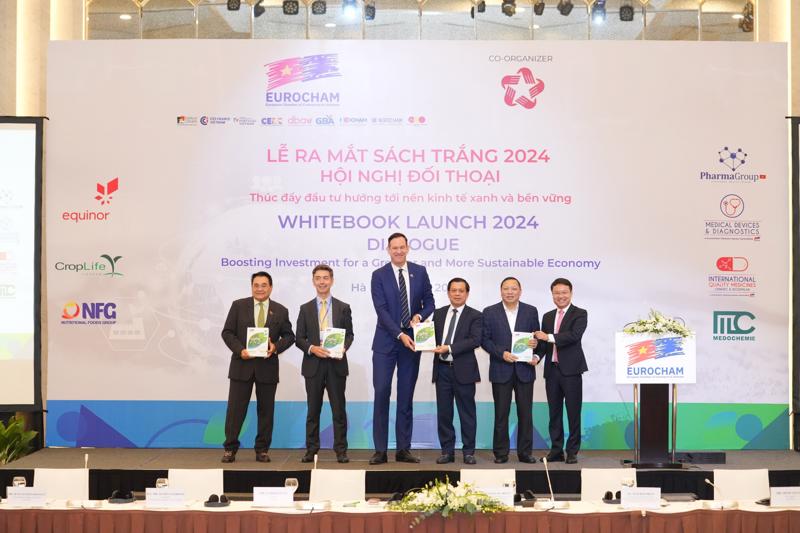The European Chamber of Commerce in Vietnam (EuroCham) unveiled its 15th annual Whitebook on January 16 in Hanoi, offering insights from the European business community into Vietnam’s business policies.
Ambassador of the EU to Vietnam, H.E. Julien Guerrier, emphasized at the unveiling the importance of cooperative efforts in realizing the potential of these recommendations. “By carefully considering the recommendations in this Whitebook, listening to each other’s opinions, and actively engaging in the implementation of the EU-Vietnam Free Trade Agreement (EUVFTA) and other EU-Vietnam initiatives, we can contribute to the growth and prosperity of our economies,” he noted.
EuroCham Chairman Gabor Fluit said that, in recent times, despite a complex global economy, Vietnam has shown resilience and flexibility. This is evident in the increasing European investment in the country, which is a testament to its economic strength.
However, he went on, optimism must be balanced with realism. 2024 will present its own unique set of difficulties. Though Vietnam is expected to be a leader in GDP growth, the economic environment will likely not be as favorable as prior to 2020. We need to brace ourselves for ongoing issues such as reduced exports and imports, persistent supply chain disruptions, and other unexpected challenges that demand our immediate focus and action.
As Vietnam navigates the challenges and opportunities, adaptive policies will be key.
Turning to the broader context, the EUVFTA has significantly boosted Vietnam-Europe relations, enhancing trade and investment. However, there is still untapped potential in the agreement, underscoring the importance of refining policies and partnerships for mutual benefit.
In his address, Chairman Fluit also revealed details about the upcoming EuroCham Green Economy Forum & Exhibition (GEFE) 2024. “On the strength of our past accomplishments, GEFE will expand its scale and impact in 2024,” he added. “We plan to gather leaders from both Vietnam and Europe, spanning various sectors and government levels, for three days of in-depth discussions, conference sessions, networking opportunities, and an exhibition. The event is designed to strengthen partnerships and foster dialogue, accelerating the implementation of practical sustainability solutions across Vietnam.”
“As a newly formed EuroCham committee in 2023, we aim to cooperate with Vietnam to enhance efficiency and clarity within its vibrant construction sector,” said Mr. Michel Cassagnes, Chairman of the EuroCham Construction Sector Committee. “Specifically, we suggest streamlining equipment certification to avoid project delays. Recognizing both international and equivalent local standards could allow faster approval while still ensuring safety.”
He added that by reconciling essential safeguards and reasonable flexibility, positive development can benefit all involved via constructive dialogue. “We remain committed to supporting the industry’s equitable and sustainable growth,” he said.
Mr. Paul-Antoine Croize, Chairman of the EuroCham Vietnam Food Agri & Aqua Business Sector Committee (FAABS), affirmed that in a spirit of supportive partnership, FAABS’ recommendations in EuroCham’s Whitebook identify ways to assist Vietnam in leveraging the EUVFTA.
“We propose practical solutions like cooperative training, impactful educational programs, targeted capability investments, and unifying partnerships,” he added. “We advocate environmentally-sustainable models that simultaneously ensure food safety and expand innovative financing options. By promoting eco-friendly and organic techniques, we believe Vietnam can profitably elevate the supreme quality and value of its produce for both domestic and global consumers. Adopting prudent financial strategies and a One Health approach to reduce antimicrobials are important next steps. These forward-thinking measures represent key milestones along the shared journey towards an advanced and internationally competitive Vietnamese agriculture sector.”
According to Mr. Erik Contreras, Chairman of the EuroCham Green Growth Sector Committee, through the Green Growth Sector Committee’s Whitebook chapters it aims to partner with Vietnam to champion next-generation sustainability solutions across key industries.
“To support Vietnam’s renewable energy future, we recommend focused cooperation on streamlining clean power investments and purchase agreements, and swiftly delivering effective regulations to enable and maintain the delivery of green energy growth that maximizes Vietnam’s potential in this area whilst supplementarily supporting a socioeconomic boost to the supply chain and labor force,” he said. “Allowing greater private sector participation is critical for realizing a fossil fuel-free future that preserves enduring prosperity.”
The Whitebook is a cooperative compendium of recommendations for stimulating investment and trade priorities for Vietnam’s growth. It provides Vietnamese and European policymakers, businesses, academics, and other stakeholders with practical perspectives on key economic issues.
The analysis and recommended policy updates seek to support bilateral dialogue on trends, challenges, and opportunities in areas like sustainability, digitalization, finance, and infrastructure.
By informing discussions among diverse interest groups, the Whitebook plays an important role in shaping future initiatives and investment strategies between Vietnam and Europe.









 Google translate
Google translate